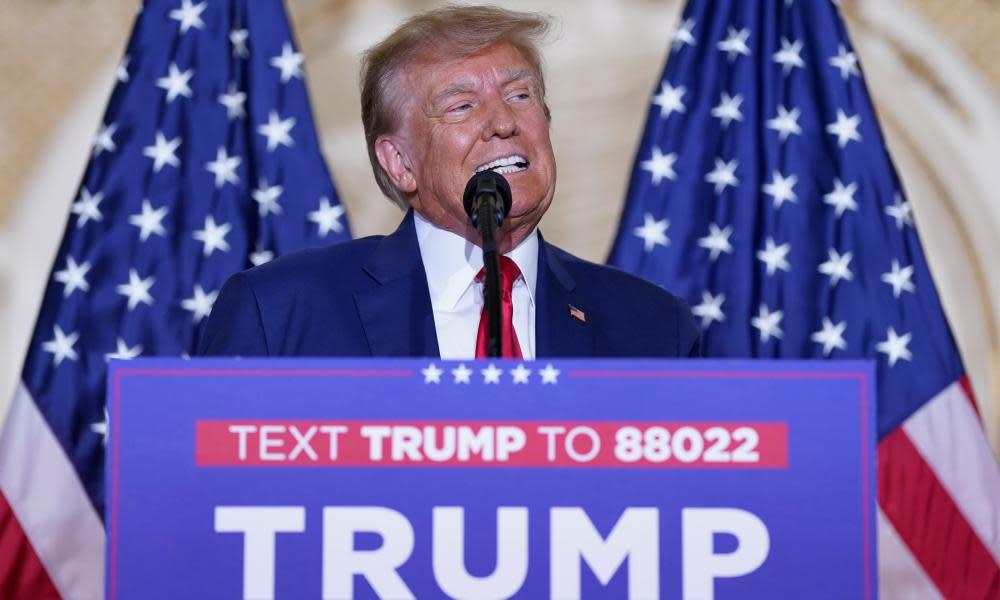Trump’s lawyers told he is target in Mar-a-Lago documents investigation

- Oops!Something went wrong.Please try again later.
Federal prosecutors formally informed Donald Trump’s lawyers last week that the former president is a target of the criminal investigation examining his retention of national security materials at his Mar-a-Lago resort and obstruction of justice, according to two people briefed on the matter.
The move – the clearest sign yet that Trump is on course to be indicted – dramatically raises the stakes for Trump, as the investigation nears its conclusion after taking evidence before a grand jury in Washington and a previously unknown grand jury in Florida.
Trump’s lawyers were sent a “target letter” days before they met on Monday with the special counsel Jack Smith, who is leading the Mar-a-Lago documents case, and the senior career official in the deputy attorney general’s office, where they asked prosecutors not to charge the former president.
Trump has reportedly said he had not been personally informed by the justice department that he was a target when asked directly by a New York Times reporter, but demurred when asked whether his legal team had been told about the designation.
The development comes as prosecutors have obtained evidence of criminal conduct occurring at Mar-a-Lago and decided that any indictments should be charged in the southern district of Florida, where the resort is located, rather than in Washington, according to people familiar with the matter.
To that end, prosecutors last month started issuing subpoenas to multiple Trump aides that compelled them to testify before a new grand jury in Florida, impaneled around the time that the grand jury in Washington stopped taking new evidence, the Guardian previously reported.
On Wednesday, former Trump spokesperson Taylor Budowich testified before the Florida grand jury and was asked in part about a statement that Trump drafted in early 2022 that said he had given “everything” back after he returned 15 boxes of materials to the National Archives.
The statement was never issued, Budowich is understood to have confirmed. Several aides to Trump were against releasing the statement because they were not confident that the assertion was accurate, a person close to the former president said.
What charges might emanate from the Florida grand jury remains unclear.
But prosecutors would most probably prefer to bring charges in Washington, where the judges at the US district court are more familiar with handling national security cases – though Florida also has a robust national security section – and the jury pool skews more Democratic.
The impaneling of grand juries has to do with where prosecutors believe a crime was committed. And the most straightforward reason for the Florida grand jury is that prosecutors have developed evidence of criminal activity at Mar-a-Lago, which is in the southern district of Florida.
In this investigation, prosecutors considering charges against Trump for retaining national security material may have concluded from the evidence that he was still president when classified documents were moved to Mar-a-Lago, meaning his “unlawful possession” only started in Florida.
Similarly, if prosecutors have also developed evidence that Trump knew he had retained national security documents after he left office at Mar-a-Lago, for instance by waving them around or showing people, that could present hurdles to charging Espionage Act violations in Washington.
The venue for an obstruction of justice charge is more difficult to deduce, meanwhile, because the courts have provided little guidance about how it should be applied under section 1519 of the US criminal code, which prosecutors listed on the affidavit for Mar-a-Lago search warrant
Generally, other obstruction statutes hold that the venue depends on where the impeded proceeding was taking place. In the Trump documents investigation, the subpoena last year demanding the return of classified documents was issued in Washington.
The US court of appeals for the DC circuit, however, has ruled in previous cases that the correct venue is where acts of obstruction took place. If prosecutors are considering obstruction charges for Trump’s steps to conceal classified documents after the subpoena, Florida could be the venue.

